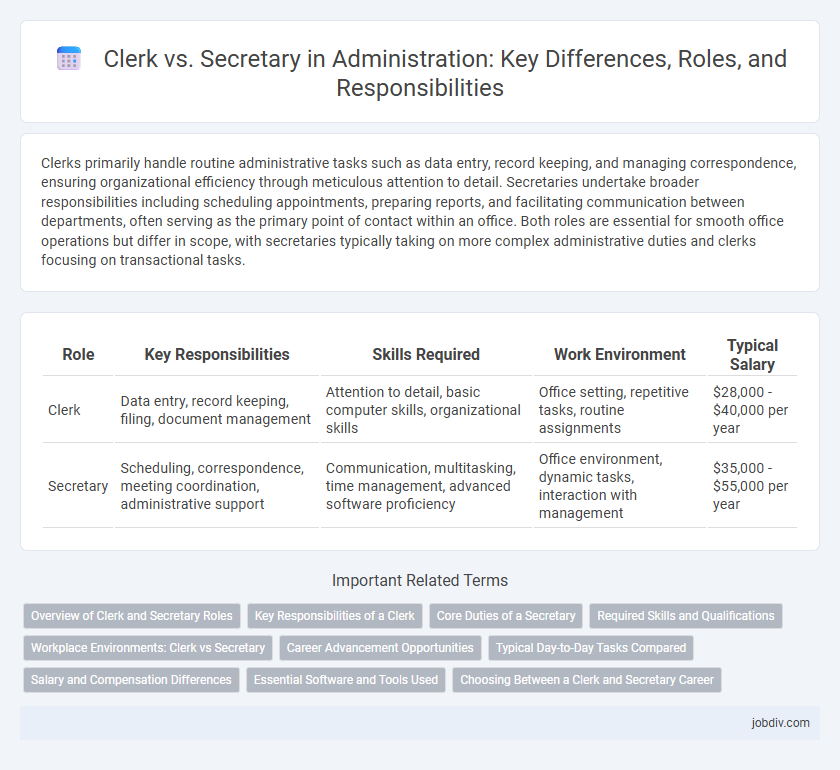Clerks primarily handle routine administrative tasks such as data entry, record keeping, and managing correspondence, ensuring organizational efficiency through meticulous attention to detail. Secretaries undertake broader responsibilities including scheduling appointments, preparing reports, and facilitating communication between departments, often serving as the primary point of contact within an office. Both roles are essential for smooth office operations but differ in scope, with secretaries typically taking on more complex administrative duties and clerks focusing on transactional tasks.
Table of Comparison
| Role | Key Responsibilities | Skills Required | Work Environment | Typical Salary |
|---|---|---|---|---|
| Clerk | Data entry, record keeping, filing, document management | Attention to detail, basic computer skills, organizational skills | Office setting, repetitive tasks, routine assignments | $28,000 - $40,000 per year |
| Secretary | Scheduling, correspondence, meeting coordination, administrative support | Communication, multitasking, time management, advanced software proficiency | Office environment, dynamic tasks, interaction with management | $35,000 - $55,000 per year |
Overview of Clerk and Secretary Roles
Clerks manage day-to-day administrative tasks such as recordkeeping, data entry, and filing to support organizational operations efficiently. Secretaries coordinate communication, schedule meetings, prepare documents, and handle correspondence to ensure smooth office workflow. Both roles are essential for administrative support but differ in scope, with clerks focusing on operational duties and secretaries handling executive assistance.
Key Responsibilities of a Clerk
A clerk manages fundamental office tasks such as data entry, record keeping, and document filing to ensure efficient administrative operations. They handle correspondence, maintain inventories, and assist with scheduling, supporting various departments with routine administrative duties. Precision in handling clerical tasks and maintaining organized records is essential for accurate information flow within an organization.
Core Duties of a Secretary
Secretaries manage correspondence, schedule meetings, and maintain official records to ensure smooth office operations. They prepare reports, handle communications, and coordinate administrative tasks efficiently. Their role requires strong organizational skills and attention to detail to support executive functions effectively.
Required Skills and Qualifications
Clerks require strong organizational skills, attention to detail, and proficiency in data entry and basic computer applications, often needing a high school diploma or equivalent. Secretaries must possess advanced communication abilities, multitasking skills, and familiarity with office software suites, typically requiring some postsecondary education or specialized training. Both roles demand time management and interpersonal skills, but secretaries often require higher-level qualifications due to their responsibility in managing schedules and correspondence.
Workplace Environments: Clerk vs Secretary
Clerks typically work in structured environments such as offices, government agencies, or retail settings where they handle data entry, filing, and routine administrative tasks. Secretaries often operate in more dynamic office settings, supporting executives or managers with scheduling, correspondence, and communication management. The workplace environment for secretaries usually demands higher interaction with staff and external contacts compared to clerks, whose roles are more task-specific and procedural.
Career Advancement Opportunities
Clerks typically have limited career advancement opportunities, often progressing to senior clerk roles or specialized administrative positions with additional experience or certifications. Secretaries benefit from broader career pathways, including executive assistant roles, office management, or specialized administrative careers in legal, medical, or corporate sectors. Professional development, advanced communication skills, and proficiency in office software significantly enhance career growth potential for both clerks and secretaries.
Typical Day-to-Day Tasks Compared
Clerks handle routine administrative duties such as filing, data entry, and managing correspondence, ensuring the smooth operation of office tasks. Secretaries perform more complex responsibilities including scheduling meetings, preparing reports, and serving as a liaison between executives and staff. While clerks focus on task-specific support, secretaries provide broader organizational assistance and communication management.
Salary and Compensation Differences
Clerks typically earn an average salary ranging from $30,000 to $45,000 annually, reflecting entry-level administrative responsibilities, while secretaries command higher compensation between $40,000 and $60,000 due to more advanced duties and specialized skills. Factors influencing these salary differences include job complexity, level of experience, and educational requirements. In addition to base pay, secretaries often receive better benefits packages and opportunities for bonuses compared to clerks.
Essential Software and Tools Used
Clerks frequently utilize data entry software, document management systems like Microsoft Excel and Google Sheets, and basic accounting tools such as QuickBooks to maintain accurate records and streamline office workflows. Secretaries rely heavily on comprehensive scheduling applications such as Microsoft Outlook, word processing software including Microsoft Word, and communication platforms like Zoom or Slack to manage correspondence, coordinate meetings, and support executive functions efficiently. Both roles increasingly incorporate cloud-based collaboration tools, ensuring seamless access to files and real-time updates within administrative teams.
Choosing Between a Clerk and Secretary Career
Choosing between a clerk and secretary career depends on key administrative responsibilities and skill sets; clerks typically handle data entry, record keeping, and routine office tasks, while secretaries manage communication, scheduling, and executive support. Understanding job requirements, such as clerical precision versus interpersonal communication, influences career direction in administrative roles. Salary ranges, job growth projections, and work environments further guide candidates in selecting the optimal role aligned with their strengths and career goals.
Clerk vs Secretary Infographic

 jobdiv.com
jobdiv.com